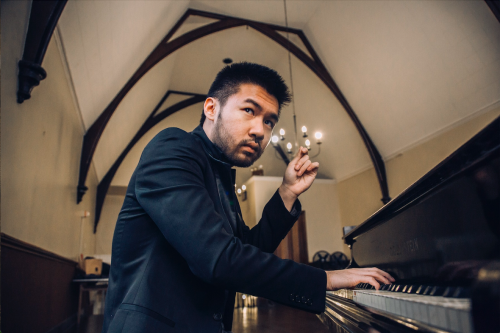 United States Various: Conrad Tao (piano). Cal Performances, Hertz Hall, University of California, Berkeley, 3.3.2024. (HS)
United States Various: Conrad Tao (piano). Cal Performances, Hertz Hall, University of California, Berkeley, 3.3.2024. (HS)

Brahms – Klavierstücke, Op.118
David Fulmer – ‘I have loved a stream and a shadow’
Todd Moellenberg – ‘Leg of Lamb’
Rebecca Saunders – ‘mirror, mirror on the wall’
Ravel – Gaspard de la nuit
Conrad Tao creates thoughtful programs that go beyond a display of his often jaw-dropping technical virtuosity. For his recital in Berkeley’s cozy Hertz Hall, he drew inspiration from, of all things, line breaks in poetry.
The line in question appears in a poem by Bernardette Mayer, ‘Leg of Lamb’:
‘A line
Break could reflect
The way the sun breaks
Through the clouds or breakfast’
For Tao, this thought suggested the way he likes to juxtapose pieces written centuries apart in his program lineups. The point, he writes, is ‘to hear familiar works in new dimensions’.
In this concert, he interspersed the six short pieces in Brahms’s Klavierstücke, Op.118 (which he is playing in public for the first time on this tour) among several contemporary works and a blockbuster by Ravel. Pieces written especially for him by David Fulmer and Rebecca Saunders specifically played on aspects of Brahms’s ballade, romanze and four intermezzos. Mostly cast in song form, all the music was indeed inspired by poetry.
The first movement of Fulmer’s three-part ‘I have loved a stream and a shadow’ echoed Brahms’s form with its concise, free, rhapsodic style. The contemporary composer’s elegance within full-bodied, rich harmonies almost felt like it grew directly out of Tao’s dynamically dramatic yet eloquent playing of the intermezzo that preceded it.
And yes, it did put that intermezzo, the ballade and another intermezzo into a different light, emphasizing the freely flowing form in Brahms’s song-like writing. Rebecca Saunders’s ‘mirror, mirror on the wall’ (from 1994) indulges in dissonance and weirdness, a nightmare perhaps fitting for its reference to the fairy tale, ‘Snow White’.
The return to Brahms, with the lush and soulful romanze, felt like a sigh of relief. Tao played it with melting tenderness.
‘Leg of Lamb’ opened the second half, notable due to composer Todd Moellenberg’s use of the pianist’s voice to recite the poem. It used the rhythms and gestures of the poetry as the literal basis for the piano part. As a centerpiece for the thoughts behind this whole program, it had its charms, even if the music itself came off as a bit robotic.
Better was what came next – the remaining two movements from Fuller’s three-part piece. Its straightforward gentleness set up yet another contrast before ending the program with the final intermezzo. Ravel’s evocative and technically challenging Gaspard de la nuit, literally a scene-by-scene expression of three poems by Aloysius Bertrand, got a dramatic and effusive performance. Tao found the sensuous ripples of ‘Ondine’ and the funereal atmosphere of ‘Le gibet’, then made the most of Ravel’s riotous piano virtuosity in ‘Scarbo’.
Finishing with the last Brahms intermezzo emphasized any tones of regret and resignation, and Tao played it with elegance.
For an encore, Tao told the audience he wanted to bring in some sunlight. He rolled out his own transcription of Art Tatum’s solo version (recorded 1953) of Harold Arlen’s ‘Somewhere Over the Rainbow’. Tao settled into some good rhythmic grooves amid Tatum’s signature torrents of notes. In keeping with the emotional intensity of the rest of the program, however, Tao went for a more dramatic reading than Tatum’s. He used more pedal, and stretched the dynamic range, thus creating a very personal take on an iconic jazz solo.
Harvey Steiman
